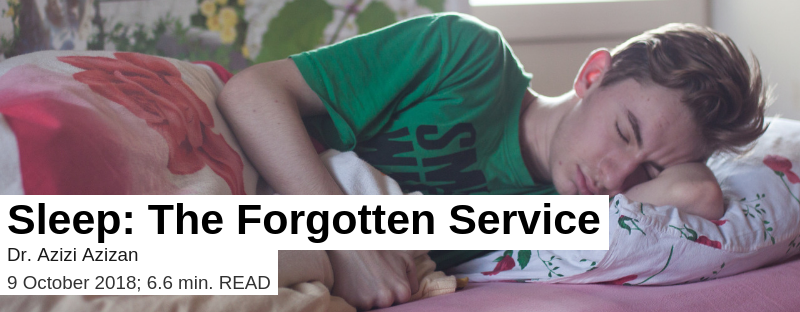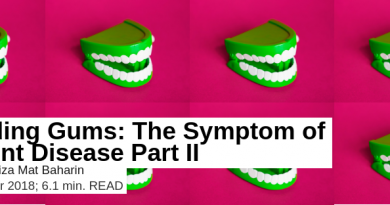Sleep: The Forgotten Service
“Each night when I go to sleep, I die. And the next morning when I wake up, I am reborn” – Mahatma Gandhi.
Sleep by definition is a natural, temporary and recurring process that involves the suspension of consciousness along with a degree of muscle relaxation. It is one of the important routines required by our body and on average, a third of our life spent entirely on sleeping.
A good sleep is said can improve physical and mental states of a person. Physically, a good quality sleep has been shown to be able to promote wound recovery and sound health such as, the prevention infliction of the heart and infectious diseases. From a mental perspective, sleep plays a key role in facilitating the learning process and helps focus and memory consolidation that are critical to acquisitions of new information and skills.
Despite of its importance, sleep disorder has becoming unsurprisingly a common problem for the working generation these days. The reasons for this could be linked to heavy workloads and working odd hours. This has led to many young professionals, such as, myself in experiencing hectic and stressful lifestyles. All these, have negative effect on your normal sleep cycle by disrupting it. As a result, some of you might find it is harder to fall asleep and others might struggle to have good night rest due to constant waking up throughout the night for no obvious reason.
Sleep disorder, if left unchecked, can lead to more serious health problems. The studies find that poor quality sleep can cause somnolence, or excessive day-time sleepiness. Somnolence is also common among patients with severe illness, and it is a way for the body responding to the process of recovery. In a research conducted by the University of Chicago where they followed students who slept only four hours a day for six days, they find that sleep-deprived students have higher blood pressure, released higher stress hormones and produced half of the normal antibodies.
Fortunately, the body has been designed to take account the payment of sleep debt. The researchers of University of Chicago find that the changes experienced by the sleep-deprived students are reversed when they compensate the sleep that they have lost. This further highlights the import of practicing a good sleep habit. The following are simple tips that useful to achieve good and restful sleep.
Consistency Is the Key to Good Sleep Hygiene
Most of us drive the same route to work every day, right? Ever wonder how sometime we just auto-piloting our way to work without putting too much thoughts about it. Why is that? This is because humans are creatures of habit and the more we established this routine the better we are cruising at life. We should implement this strategy to our sleeping pattern as well. Try going to bed and waking up the same time every day (and this is including weekends). This routine will help establish a more stable sleep cycle.
Avoid Stimulants Before Sleep
Alcohol, nicotine (from smoking) and caffeine are notoriously known to disturb the sleeping cycle. Not only these substances make it difficult for you to fall asleep, they are also known to stimulate your bladder and increase urine production. Your sleep can be interrupted by forcing you to wake up in the middle of the night to empty that bladder. Strenuous physical activities and a large meal can act as strong stimulants as well, and should be avoided 4 hours prior to your bedtime.
Setting Up the Right Sleeping Mood
Your bed should be reserved only for sleeping. Try to dissociate it from other activities for instance, eating, watching movies, or even making phone calls. Set the sleep mood by wearing a comfortable pyjamas, having the right temperature for the room and taking a warm shower prior to sleep. It should be taken into consideration by making a habit sleeping in the dark. Many studies have shown that the presence of light could suppress melatonin production, which is a hormone that the body produces to help you sleep. Other things to consider are the use of sleeping aids such as, playing soothing sounds in the background or even white noise.
Live Your Day to the Max
While it is not advisable to engage with strenuous activities 4 hours before the bedtime, it is entirely different during the day. It is highly recommended for you to expend your energy to the maximum in day-time. If you normally have time constraints, make sure you at least have regular doses of exercise. However, if time is not an issue for you, it doesn’t hurt to opt for a short walk in the park, or nature, as an adequate exposure to natural sun light can help improve your sleep-wake cycle. If all the above suggestions are simply impossible for you, try avoid unnecessary, or excessive nap during the day. The less tired you are, the more likely for you to stay awake.
When you think about it, the irony of capitalism world that we are living in today is that in exchange for all the benefits of having more wealth, it also has robbed us of our many prerogatives as simple as a good, nice sleep. Caught up with the rat race, we have forgotten the great service of sleep.
Reference list
Gooley, J. J., Chamberlain, K., Smith, K. A., Khalsa, S. B. S., Rajaratnam, S. M., Van Reen, E., … & Lockley, S. W. (2011). Exposure to room light before bedtime suppresses melatonin onset and shortens melatonin duration in humans. The Journal of Clinical Endocrinology & Metabolism, 96(3), E463-E472. Available at https://www.ncbi.nlm.nih.gov/pmc/articles/PMC3047226/
Sleep Hygiene and Stimulus Control Fact Sheet for Patients (RACGP) Available at: https://www.racgp.org.au/your-practice/guidelines/drugs-of-dependence-b/resource-d-communication-with-patients/d4-sleep-hygiene-and-stimulus-control-fact-sheet-for-patients/
Sleep Hygiene (Sleep Disorder Australia [SDA]). Available at: https://www.sleepoz.org.au/application/files/9814/8446/9667/AT09-Sleep_Hygiene.pdf
Spiegel, K., Leproult, R., & Van Cauter, E. (1999). Impact of sleep debt on metabolic and endocrine function. The lancet, 354(9188), 1435-1439.
Wyatt, J. K. (2016). Overview of Circadian Sleep-Wake Rhythm Disorders. UpToDate. September. Available at https://www.uptodate.com/contents/overview-of-circadian-sleep-wake-rhythm-disorders

Dr. Azizi Azizan is an advanced trainee of CICM and ICU Senior Registrar with Liverpool Hospital, Australia.
Contact info: dr.azizi123@gmail.com




